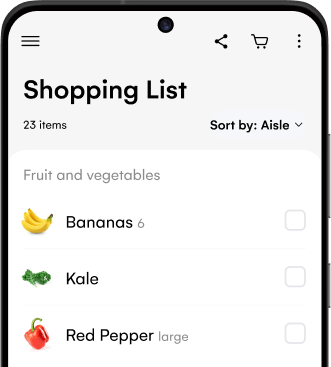Estimated reading time: 6 minutes
Overeating is generally considered to be consuming more food than the body needs, or eating more than the recommended amount for one’s age, gender, and activity level. It can also refer to eating too frequently or eating in response to emotional triggers rather than physical hunger. Overeating can lead to weight gain and other health problems.
Plan meals together! Share this plan with your family

If you find yourself struggling with overeating, what can you do to stop or limit it? The journey is a fairly individual one, but there are some science-backed strategies which might help you curb the urge to overeat.

When is overeating a problem?
It’s true that almost everyone overeats from time to time. We’ve all had an extra portion of food at a family gathering or helped ourselves to pizza with friends when we’d already had dinner. So when exactrly does it become problematic? The line is blurry.
While the odd meal or snack which is a bit bigger than normal isn’t going to do any harm, regular overeating can. Physically, you might find that you develop health problems linked to obesity or blood sugar issues.
On top of that though, overeating can also be linked to disordered eating. And emotional eating. And plenty of other mental wellbeing issues.
How do you stop overeating?
People overeat for many different reasons. Some people eat too much when they feel stressed, while others overeat due to a lack of planning or because they use food as a pick-me-up.
It’s important to address the underlying causes of overeating in order to effectively manage it. The good news is that there’s almost as many ways to stop overeating as there are reasons it starts.
None of them are fool proof, and you’ll need to be aware of your hunger cues. But some strategies include.

Keeping a food diary
We all have those moments where we grab a snack or eat something without really paying attention, and before we know it, we’ve overeaten. Or when you realise at the end of the day that you ate three chocolate bars and five meals.
Keeping a food diary can be a useful tool to help you become more aware of your eating habits. By jotting down what you eat, when you eat it and how you feel, you’ll be able to identify patterns and triggers for your overeating.
Once you know what triggers your overeating, you can start working on ways to avoid or manage them.
Mindful eating
Have you ever found yourself eating in front of the TV or while scrolling through your phone? It’s common practice nowadays. But the problem is that in the blink of an eye, the food is gone and you don’t even remember enjoying it. Sometimes you don’t even remember eating it, let alone enjoying.
Mindful eating can be a helpful practice to try. It’s all about being fully present and paying attention to the experience of eating. By taking the time to savor the flavors, textures and smells of your food, you’ll be able to eat more slowly, enjoy your food more and be more satisfied with smaller portions. It’s also a great way to identify when you’re truly hungry and when you’re eating for other reasons, like stress or boredom. And by being more mindful of your body’s signals of fullness, you’ll be able to stop eating when you’re satisfied, instead of overeating.
If that isn’t quite up your alley, intuitive eating might be a better fit. They’re similar, but not quite the same.
Eating regular, balanced meals to stop overeating out of hunger
Skipping meals can lead to overeating later in the day. And cutting out or restricting food heavily can too.
So it’s important to have regular, balanced meals and allow yourself to eat all food groups. When you’re hungry, it’s easy to grab whatever is in reach, and often it’s not the healthiest option. By having regular meals, you’ll be less likely to overeat as you should feel fairly satisfied for most of the day.
Save time on grocery shopping

And by having a balanced meal that includes protein, healthy fats and carbohydrates, you’ll be able to keep your hunger levels in check and have more energy throughout the day. Plus, eating balanced meals can help you not to feel deprived, so you’re more likely to stick to your eating plan.
It’s also a good idea to plan your meals in advance, which is where Samsung Food comes in handy. Not only can you plan all your meals with any recipe, you can also share them with family and friends.
Practicing stress management techniques
We all have stress in our lives. Some causes of stress are harder to manage than others, and some are more permanent than others too. Though in certain situations stress can be useful, it can also be a major trigger for overeating. We’ve all reached for the pizza or ice cream when we’re anxious or have nervously eaten finger food at a party just to have something to do.
If your stress levels are off the charts, it’s important to find ways to manage them. Whether it’s through exercise, yoga, meditation, or talking to a therapist, finding activities that help you relax and reduce stress can be a huge help in managing overeating.
Get enough sleep
You know how it feels to be tired, you just want to grab something to eat, and it’s usually not the healthiest option. Getting enough sleep is important for many reasons, including managing overeating. When you’re well-rested, you’re more likely to make healthier food choices, and you’ll have more energy to be active and maintain a healthy weight.

If you can’t stop overeating, consider seeking professional help
Overeating can be a difficult habit to break on your own. If you find that you’re unable to manage it, consider seeking help from a therapist or qualified nutritionist. Or both.
They’ll be able to help you develop a personalized plan for managing your eating habits and work with you to address the underlying causes of your overeating. After all, being able to enjoy food without guilt or shame is something everyone should have the pleasure of.
It’s important to remember that it’s not a failure to ask for help, it’s a step towards making positive changes in your life. With the right support, you can curb overeating and reap the rewards of a balanced and varied diet.
Words by Sophie Baker



